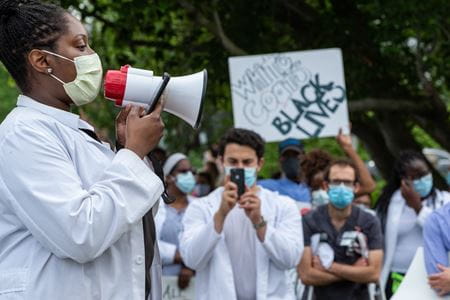The COVID-19 pandemic illuminated health inequities perpetuated by our nation’s history of systemic racism as Black/African American, Hispanic/Latinx and indigenous populations remain disproportionately at higher risk for infection, hospitalization and death from COVID-19. These health care disparities among minoritized communities did not arise overnight but are the result of historic social, economic and political disenfranchisement.
As 2020 ends, we reflect on what we’ve learned about diversity, equity, and inclusion (DEI) and look ahead to build upon those lessons.
Doing More Together
 by Patricia Treadwell, MD
by Patricia Treadwell, MD
Chief Diversity Officer and Special Advisor to the Dean
Dean Jay Hess, MD, PhD, MHSA, is committed to making Indiana University School of Medicine a place where all individuals in the medical school community, at all nine campuses, feel valued, respected and encouraged.
As a tangible step to addressing DEI within our walls, in June 2020, Dean Hess, appointed me to work across the institution to advance diversity, equity and inclusion initiatives across all mission areas of the school in partnership with the dedicated diversity team led by the associate dean of diversity Alvaro Tori, MD, and Mary Dankoski, PhD, executive associate dean for Faculty Affairs, Professional Development, and Diversity (FAPDD).
There are many opportunities for the school community to effect real change – both within IU School of Medicine and beyond.
For the first time in the school’s history, a series of Diversity Town Halls in the fall allowed school leaders to hear from faculty, staff and learners about areas of concern. Input gathered on this ‘listening tour’ gave IU School of Medicine leadership valuable insights into the areas where we can do better.
As a medical school, before we can make significant inroads in challenging health disparities in our communities, we must first look inward, at the root causes. As students, residents, faculty and staff, we must begin taking sizable strides in thwarting the racism that pervades our society.
Future town halls are being planned for February 2021.
What’s Ahead – 2021 Diversity Events, Programs and Policies
 by Mary Dankoski, PhD
by Mary Dankoski, PhD
Executive Associate Dean for Faculty Affairs, Professional Development, and Diversity (FAPDD)
As we reflect on what we’ve learned and how we can improve, we look ahead to what the new year brings. The diversity office hosts professional development events year-round that are open to faculty, staff and learners. Below are a few marquee events that have been planned for the first half of 2021.
- Systemic Racism in Legislative and Administrative Decisions: Lessons Learned from COVID-19
Thursday, January 28 | Noon - 1 pm | Register - LGBTQ Health Care Conference
March 25 – March 26 | All day | Register - Patricia Treadwell Women in Leadership Lecture featuring Marly Bradley, MD, JD, FAA
March 1 | Noon – 1 pm | Register - Stepping Stones of Women in Leadership Series
- Elaine Cox, MD, Chief Medical Officer for Riley’s Children Hospital at IU Health
January 25 | 11:45 am – 1 pm | Register - Brownsyne Tucker Edmonds, MD, MPH, MS, Assistant Dean for Diversity Affairs
February 9 | 11:45 am – 1 pm | Register - Regina Kriesle, MD, PhD, IU School of Medicine – West Lafayette Regional Campus Director
March 16 | 11:45 am – 1 pm | Register - Virginia Caine, MD, Director of Marion County Public Health Department
April 20 | 11:45 am – 1 pm | Register
- Elaine Cox, MD, Chief Medical Officer for Riley’s Children Hospital at IU Health
More events are being planned throughout the year. View all FAPDD diversity events.
Additionally, many departments and divisions are hosting their events across the nine regional campuses. For a comprehensive listing of all diversity events across IU School of Medicine, please visit the events calendar and in the field, “other tags” select “diversity.”
Programs and policies
Many diversity programs centered around the three pillars of diversity focus on recruitment and retention, inclusive climate, and cultural competency training.
Our team focuses on how we can accelerate efforts in diversity, equity and inclusion— specifically, how we can be more of an anti-racist organization. We work to create programs and influence policies that impact the culture in which we learn, work and practice.
The George Floyd case sparked a national conversation on race relations. It became clear that members of the IU School of Medicine community needed to be equipped and empowered to engage in these dialogues. Launched this fall, Implementing Conversations to Advance Racial Equity (IU School of Medicine ICARE) aims to prepare members of the IU School of Medicine community to lead active conversations related to addressing systemic racism and race inequities. The series is designed to advance the cultural competence and cultural humility of faculty, staff and learners at all levels. Applications for the next cohorts are already open.
A $7 million grant from the Health Resources & Services Administration known as PRIME—Primary Care Reaffirmation for Indiana Medical Education—will allow the school to address inequities in health care that have been amplified by the COVID-19 pandemic and current events highlighting systemic racism. This grant is being led by Paul Wallach, MD, executive associate dean for Educational Affairs and Institutional Improvement, and Bradley Allen, PhD, MD, senior associate dean for Medical Student Education. Several new leadership positions will align with the school’s DEI efforts. These roles will build a curriculum designed to help future physicians recognize and address bias and provide better care for the underserved.
The IU Gender Equity in Research Task Force, convened by Fred Cate, vice president for research, is addressing the disparate impact of the pandemic on women scientists and others with significant caregiving responsibilities. Additionally, faculty annual review evaluations have been updated to include a COVID-19 impact statement and faculty and staff contributions to advancing diversity, equity and inclusion. In 2021, we will also be updating promotion and tenure criteria to better reflect faculty efforts toward this end.
Reflection – Honoring Those who Paved the Way
 by Alvaro Tori, MD
by Alvaro Tori, MD
Associate Dean for Diversity
This year, IU School of Medicine celebrated milestones that honor great individuals who have paved the way.
In February 2020, the school hosted the Opening Doors: Contemporary African American Academic Surgeons exhibit. During the exhibit’s residency, the careers of nine Black surgeons within the institution were highlighted. In October 2020, we unveiled the portrait of Clarence Lucas Sr., MD, the first Black/African American graduate of IU School of Medicine. This work was possible due to Theresa Rohr-Kirchgraber, MD, whose Diversity On the Walls project examined diverse imagery and memorialization across campus buildings.
This year marked the 25th anniversary of the Master of Science in Medical Science (MSMS) program. Started by George Rawls, MD, the first African American member of the dean’s office within IU School of Medicine, the MSMS program creates pathways for underrepresented in medicine (URM) students.
There were also opportunities to re-examine institutional biases and prejudices and work to eliminate them. A few trailblazers such as Gustavo A. Arrizabalaga, PhD; Mary de Groot, PhD; Antwione Haywood, PhD; Tara Hobson, MA; Paul Musey, MD, MSc; Dustin Nowaskie, MD; Sydney Rucker, MAT; Javier Sevilla-Martir, MD; Sacha Sharp, PhD; Sylk Sotto, EdD, MBA, MPS; Brownsyne Tucker Edmonds, MD, MPH, MS; have worked diligently to bring these topics to the forefront in their work.
Though too many to name, there are many additional faculty, learners and staff who have led efforts of diversity, equity, inclusion and justice in their areas of influence.
Notably, we applaud learners for their courage and leadership as they led the White Coats for Black Lives March in June 2020, in response to the untimely death of George Floyd. There were over 1,000 health care professionals and community members in attendance. In 2020 alone, over 160 Black/African American persons were killed due to police violence and brutality. Trainees continue to lead critical dialogue and stand against racism and brutality.
The Women’s Advisory Council addressed gender equity in science, technology, engineering and math (STEM) with their screening and panel discussion on the documentary, Picture A Scientist, and identified challenges that impact women and minoritized communities in STEM careers and academia.
These highlights only capture a few of the ways our community has collaborated. In the new year, diversity leadership will continue to lead programming and accountability measures that crystallize IU School of Medicine’s commitment to anti-racism and justice.
When we improve representational diversity so learners and patients see providers that look like them, when we create an inclusive environment where everyone feels supported and prepared for success, when we become more culturally competent and practice cultural humility so that what differentiates us does not have to divide us, then IU School of Medicine enacts its core value of diversity in a way that makes a meaningful difference in the lives of our faculty, staff, learners and the patients we serve.
Get Connected
This summer, DEI Task Forces were launched to address racism, inclusion and equity with input from faculty, staff and learners. Everyone has a crucial voice in anti-racism work. If you are interested in joining a task force, email ajtori@iu.edu.
There are many conferences, professional organizations, special topic medical student interest groups, committees and partnerships available across IU School of Medicine. If you would like to get connected but are not sure where to start, reach out to FAPDD at fapdd@iu.edu and the diversity staff can point you in the right direction.
